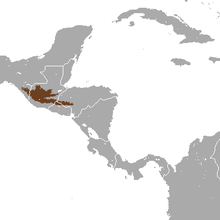Goodwin's broad-clawed shrew
| Goodwin's broad-clawed shrew | |
|---|---|
| Scientific classification | |
| Kingdom: | Animalia |
| Phylum: | Chordata |
| Class: | Mammalia |
| Order: | Eulipotyphla |
| Family: | Soricidae |
| Genus: | Cryptotis |
| Species: | C. goodwini |
| Binomial name | |
| Cryptotis goodwini Jackson, 1933 | |
 | |
| Goodwin's broad-clawed shrew range | |
Goodwin's broad-clawed shrew (Cryptotis goodwini) is a species of mammal in the Soricidae (Shrew) family. Body length and size of adults average 9.49 cm and 7.0 grams respectively making it a relatively larger shew. What distinguishes this from other shrews are its long claws.
Habitat
They range from the south part of the Siera Madre of Chiapas, to the Sierra Madra of Guatemala to the west of El Salvador and Honduras. Within Mexico it is found only in the state of Chiapas. In this mountain range it has been found ranging from 915 m to 3350 m. These forests are known to be temperate clouded. However, the C. goodwini can also be found in pine, oak, cypress, fir forests.They like other shrews in the Cryptotis genus tend to live a fossorial lifestyle burrowing in the ground for both food and shelter.
Description
The tail of C. goodwini shrew is short and it accounts for approximately 35% of their body length. The forelimbs of the shrew with its long claws distinguish this from other shrews. Relative to other shrews, their face is long and thin. Of all the species in the Crptotis genus, they show the greatest reduction in teeth. The color their coats changes each season. It is black with many vermiform (worm-like structures) during the winter. In the summer the coat lighter and lacks the worm-like structures.
References
- Insectivore Specialist Group 1996. Cryptotis goodwini. 2006 IUCN Red List of Threatened Species. Downloaded on 30 July 2007.
- Cryptotis goodwini. Jerry R. Choate, Eugene D. Fleharty. Mammalian Species, No. 44, Cryptotis goodwini (Jun. 28, 1974), pp. 1–3. American Society of Mammalogists. JSTOR
- Mammals of Mexico. Ceballos, Gerardo. Sept. 2013, Johns Hopkins University Press pp, 454-55
